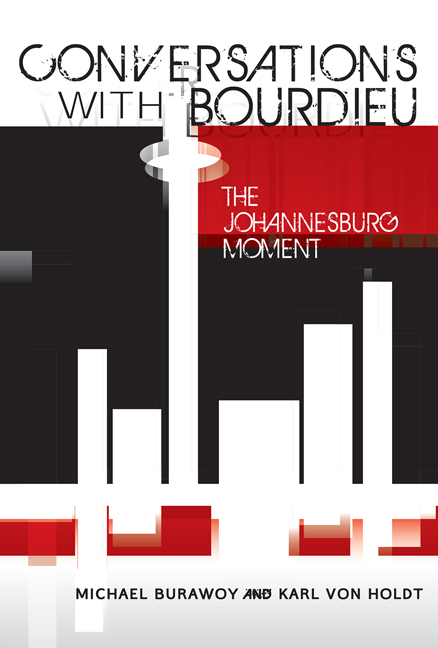Book contents
- Frontmatter
- Contents
- Abbreviations and acronyms
- Preface
- Prologue The Johannesburg Moment
- Acknowledgements
- CONVERSATION 1 SOCIOLOGY AS A COMBAT SPORT
- Bourdieu Meets Bourdieu
- Bourdieu in South Africa
- CONVERSATION 2 Theory and Practice
- CONVERSATION 3 CULTURAL DOMINATION
- CONVERSATION 4 COLONIALISM AND REVOLUTION
- CONVERSATION 5 PEDAGOGY OF THE OPPRESSED
- CONVERSATION 6 THE ANTINOMIES OF FEMINISM
- CONVERSATION 7 INTELLECTUALS AND THEIR PUBLICS
- CONVERSATION 8 MANUFACTURING DISSENT
- Epilogue Travelling Theory
- Bibliography
- Index
Bourdieu in South Africa
from CONVERSATION 1 - SOCIOLOGY AS A COMBAT SPORT
Published online by Cambridge University Press: 20 April 2018
- Frontmatter
- Contents
- Abbreviations and acronyms
- Preface
- Prologue The Johannesburg Moment
- Acknowledgements
- CONVERSATION 1 SOCIOLOGY AS A COMBAT SPORT
- Bourdieu Meets Bourdieu
- Bourdieu in South Africa
- CONVERSATION 2 Theory and Practice
- CONVERSATION 3 CULTURAL DOMINATION
- CONVERSATION 4 COLONIALISM AND REVOLUTION
- CONVERSATION 5 PEDAGOGY OF THE OPPRESSED
- CONVERSATION 6 THE ANTINOMIES OF FEMINISM
- CONVERSATION 7 INTELLECTUALS AND THEIR PUBLICS
- CONVERSATION 8 MANUFACTURING DISSENT
- Epilogue Travelling Theory
- Bibliography
- Index
Summary
What I find so striking when reading Bourdieu in South Africa is how alert his texts are to the textures of social order, how acutely conscious they are of the accumulated weight of centuries of social structure that define ‘the way things are’, and how light that weight seems, embedded as it is in language and embodied in practices that have evolved gradually over time. His analysis is fine-tuned to the intimacies of domination and subordination – to the way they are inscribed in bodies, language and psyches.
Our own social reality appears to be the polar opposite – fractured, contested, disputative, disorderly, violent. In contrast to Bourdieu's account of profoundly stable domination, reproduced as it is through the social structure of field, habitus and symbolic violence, we have challenge, reversal and constant shifts in meaning. The order of apartheid was ruptured and overthrown by countless initiatives that entailed not only resistance, but the formation of counter-orders. Symbolic violence is ‘a gentle violence, imperceptible and invisible even to its victims’ (Bourdieu, 2001 [1998]: 2); South African violence has been throughout its colonial history, and still is, rough, physical, all too visible in battered, punctured and dying bodies, whether it is police violence against strikers, subaltern violence against foreigners or domestic violence against women. So why read Bourdieu in South Africa?
It may be that Bourdieu's very attentiveness to the question of order helps us to think about the limits of order and the contestation over these limits. One of our problems is how to think about resistance, about social fragmentation, about disorder, about pervasive violence – which should necessarily mean paying attention to different kinds of order as well. Local orders that emerge ‘from below’, formed by subaltern communities and activities and not infrequently shaped by elements of pre-colonial culture and practice, as well as by new networks and organisational forms, may support or subvert state orders.
- Type
- Chapter
- Information
- Conversations with BourdieuThe Johannesburg Moment, pp. 25 - 30Publisher: Wits University PressPrint publication year: 2012

